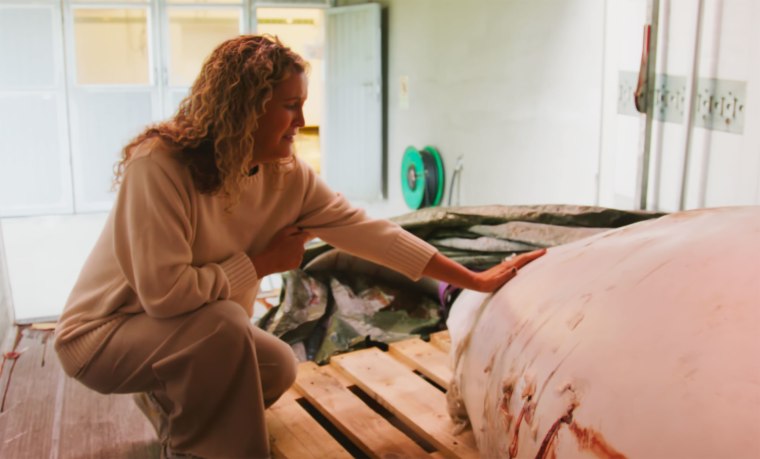Hvaldimir, ‘Russian spy’ beluga whale, may have been shot dead
Who shot Hvaldimir?
The sudden death of the beloved whale and alleged Russian spy took an unexpected turn toward a possible murder mystery Wednesday as two conservation groups filed a police report and alleged that the white beluga was killed by gunfire.
An autopsy was ongoing, however, and officials told NBC News that a definitive assessment could take up to three weeks.
The whale, who stole hearts and minds in regular appearances along the coast of Norway, was found dead last weekend in the harbor of Stavanger, a city in the country’s southwest.
Hvaldimir was known for his highly sociable and interactive behavior, as well as for wearing a harness that read “Equipment St. Petersburg,” and what appeared to be a mount for a small camera.
That prompted speculation that he had escaped from a Russian military facility where he was trained as a “spy whale” — and earned him his name, a combination of the Norwegian word for whale, “hval,” and the first name of Russian President Vladimir Putin.
Now his death is also shrouded in mystery.
The cause of Hvaldimir’s death was unclear so a decision was made to conduct an autopsy, the Norwegian Directorate of Fisheries said in a statement Monday.
Then on Wednesday, two animal rights organizations, OneWhale and NOAH, said there was “compelling evidence suggesting that Hvaldimir’s death was caused by intentional human-inflicted injury.”
Although results of his autopsy were still pending, the groups said preliminary findings indicated that the whale was killed by “gunshot wounds.”
“Several veterinarians, biologists, and ballistics experts have reviewed photographic evidence, including close-ups of Hvaldimir’s injuries,” their statement said. “Their assessments strongly suggest that the whale’s death was the result of a criminal act, prompting the need for immediate police involvement.”
The groups shared photos with what appear to be streaks of blood and holes in the lifeless body of the whale, who was 14 feet long and 2,700 pounds according to the Associated Press . NBC News could not independently verify the nature of the apparent injuries.

Regina Haug, founder of OneWhale, told NBC News that Hvaldimir was believed to be approximately 15 years old, relatively young given that beluga whales can live 60 to 70 years in the wild.
“The whale I knew and loved was a strong, capable and energetic animal yet so gentle, with a sweet and cheeky personality,” Haug said after seeing the whale’s body. “It was gut-wrenching to see this beautiful animal now lifeless. It felt like my heart had fallen into my stomach. The pain of losing him to a senseless killing is an anguish which, right now, feels impossible to fix.”
A report was filed to local police and the Norwegian National Authority for Investigation and Prosecution of Economic and Environmental Crime, OneWhale and NOAH said.
The Sør-West police issued a statement Wednesday confirming they had received the report from the groups and would assess it to see if an investigation is warranted. It had no further comment on the case.
The Norwegian Veterinary Institute told NBC News in an emailed statement Wednesday that Hvaldimir’s autopsy was still ongoing and they could not comment on results until there was enough information to reach a conclusion.
“We have together with the Directorate of Fisheries of Norway been in contact with the police ahead of the autopsy, and will of course involve them if we uncover anything indicating anything suspicious,” the statement said. “The Norwegian Veterinary Institute has a lot of experiences working with forensic cases.”
OneWhale and NOAH said they hoped possible eyewitnesses or anyone with information about the whale’s death would come forward.
Hvaldimir’s death came amid a campaign to move him to safer waters in northern Norway, where he could have joined other belugas, the groups’ statement added.
This put them at odds with a third nonprofit, Marine Mind, which voiced concerns about the relocation. It was Marine Mind that announced it had found Hvaldimir’s lifeless body floating in the harbor on Saturday.
CEO Sebastian Strand told NBC News on Wednesday that some of Hvaldimir’s injuries may have been caused by sea birds but that he was staying away from speculation on the possible cause of death until the autopsy results were out.
“The only way to know for sure what those injuries were will be the official statement from the veterinary institute that is doing the autopsy,” Strand said.





